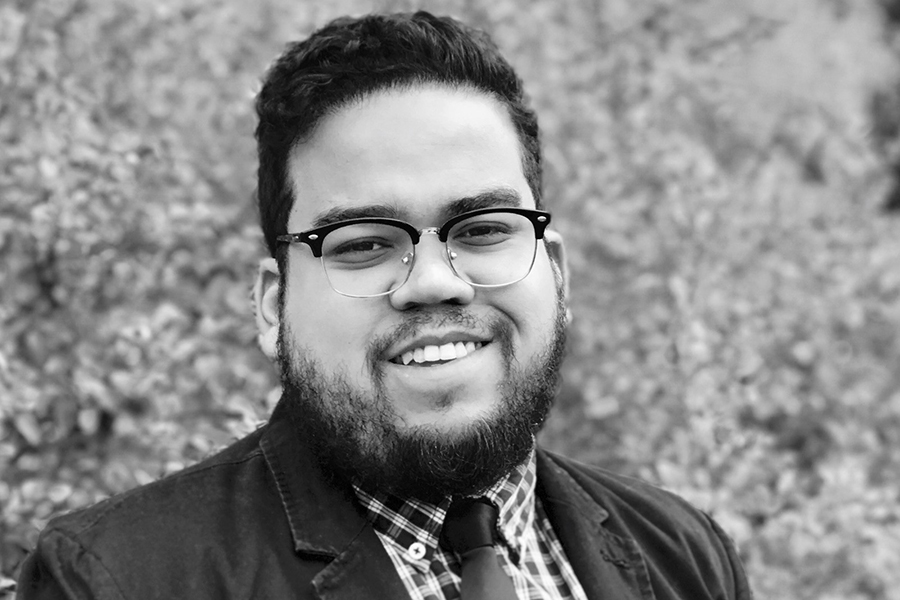Gabriel dos Passos Gomes

"Pushing the boundaries of mankind’s knowledge."
College: Arts and Sciences
Degree Program: Chemistry
Degree: Doctorate
Award: IBM PhD Scholarship (2016), Lindau Nobel Laureate Meeting Delegate (2016)
Motivation to Pursue Graduate Education:
I was a curious kid, perhaps as most scientists were as youngsters. I would ask my dad how TVs work or why cars needed gas. My dad did not always have the answers to my unstoppable questions. Until I was nineteen years old, I lived in a small town in the countryside of Brazil; scientists were not a reality of my childhood. But that desire to understand the world around me was always there. Trying to find some answers, I enrolled in a chemistry technician course during high school, where I learned the basics of laboratory techniques. I learned why cars needed gas and much more, yet that was not enough. I wanted to understand how nature really talks. Against all odds, I decided to be the first in my family to go to college.
In 2008 I began my B.Sc. in chemistry at one of the top universities in Latin America: the Federal University of Rio de Janeiro (UFRJ). In the first week of classes, our organic chemistry professor began the class by stating, “All of chemistry is inside this Schrödinger Equation—all you need to do is solve it!” I was on the edge of my chair, both exhilarated and nervous. How could everything be solved by one equation? After receiving an A in that class, I was invited by Prof. Esteves to pursue research in his lab, where I worked for four years. During this time, he taught me a great deal in physical organic and computational chemistry, as we were trying to uncover how electrophilic aromatic nitration truly works. We were able to propose a mechanism that elucidates the experimental data previously published, showing that indeed this reaction involves a single electron transfer step. This discovery earned me an award at the university undergraduate research competition, opening my eyes to the powerful role computers can play in solving interesting problems in chemistry. In the same lab, I decided to tackle an ambitious thesis. Using molecular dynamics and experiments, I proposed a mechanism for methane clathrate inhibition and introduced more efficient inhibitors, potentially increasing the efficiency of natural gas exploitation.
In parallel to my studies, I served as a committee member for the Week of Chemistry at UFRJ, an event solely organized for undergrads that showcases new science for up to 700 people in the whole country. I also busied myself working on a CERN project, managing one of its supercomputing clusters. In 2012, I was selected to study at the University of Lisbon, Portugal. This opportunity made me more determined than ever to become a great researcher and professor. After completing my year-long internship on the development of reduced graphene oxides at UL, I returned to Brazil and finished my undergraduate studies.
Why FSU?
A new turn of events changed my life in 2014: I was selected to be a visiting scholar at FSU through the Latin American Student Education and Research (LASER) program to work with the Alabugin Group for two months. As a physical organic chemistry aficionado who aimed to pursue a career as a professor in that area, it was a chance to work with some of the best minds in the field. Nonetheless, this internship yielded two papers. I followed up my short appointment by applying for the doctoral program in chemistry at FSU. When accepted, I was thrilled to continue my work with Dr. Alabugin and his team.
Importance of Research:
I am starting my fourth year this fall. I have collaborated with a very talented group of people in numerous projects in the Alabugin Group since beginning my term at FSU, and that has led us to some important publications. In addition to furthering my skills as a computational chemist, it is exciting to have the opportunity to apply those abilities to so many difficult problems. I am fortunate to have an advisor who can elicit the best work out of me, and so far, I have published eighteen papers, with seven more either submitted or in preparation. We were able to solve a broad range of problems and explain important phenomena, from orbital hybridization and stereoelectronic effects to radical cascades or the previously unveiled electronic nature of gold-catalyzed cyclizations. Dealing with radical cascade cyclizations, we were able to sort the selectivity of the radical attack out of an array of different products, identifying for the first time a practical design for a traceless directing group in such reactions. Moreover, utilizing computational chemistry tools, we were able to discover novel supramolecular effects that are present in both directing and fragmentation steps of this important radical cascade cyclization. A deeper understanding of such interactions can open doors for previously unknown reactions and hard-to-access molecules. Right now, I am not only collaborating within our group but also with researchers in Russia, Australia, Japan, and other universities in the U.S.
Academic Accomplishments:
In 2016, I was awarded the IBM PhD Fellowship. We have been working together with IBM Research, California, to understand the new polymerization mechanisms. This collaboration, a first for FSU, was recently published in the prestigious journal Nature Communications. The impact of this scholarship on my career cannot be overstated: not only was I able to obtain some external funding assistance, but also our collaboration with IBM provided me the opportunity to work on complicated problems with a more applied approach. I also served as a delegate to the 2016 Lindau Nobel Laureate Meeting.
